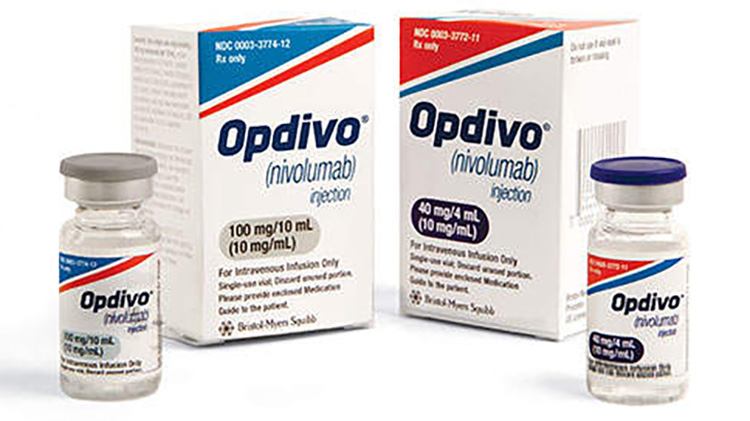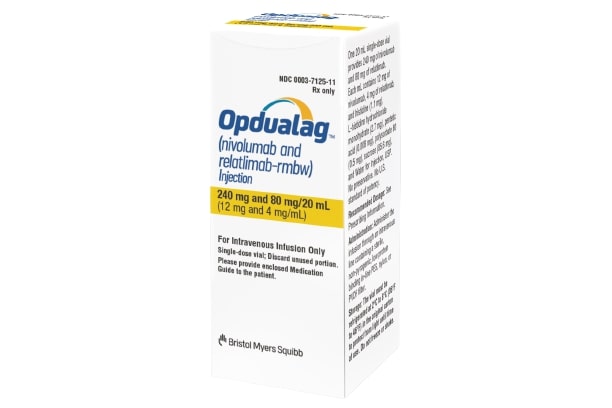Opdivo (Nivolumab) vs Opdualag (nivolumab & relatlimab)
Opdivo (Nivolumab) vs Opdualag (nivolumab & relatlimab)
Opdivo (nivolumab) is a monoclonal antibody that works as an immune checkpoint inhibitor by blocking the PD-1 protein on T cells, which can enhance the immune system's response against cancer cells. Opdualag, on the other hand, combines nivolumab with relatlimab, another monoclonal antibody that inhibits the LAG-3 protein, potentially offering a dual approach to immune checkpoint inhibition and enhancing the anti-tumor immune response. When deciding between the two, a patient should consider the type of cancer, the stage of the disease, previous treatments, and the specific indications approved for each medication, as well as discussing with their oncologist the potential benefits and risks associated with the dual inhibition offered by Opdualag versus the single-agent therapy with Opdivo.
Difference between Opdivo and Opdualag
| Metric | Opdivo (Nivolumab) | Opdualag (nivolumab & relatlimab) |
|---|---|---|
| Generic name | Nivolumab | Nivolumab & Relatlimab |
| Indications | Various types of cancers including melanoma, lung cancer, and renal cell carcinoma | Unresectable or metastatic melanoma |
| Mechanism of action | PD-1 receptor blocker that enhances the immune response against cancer cells | Combines PD-1 receptor blockade (Nivolumab) with LAG-3 blocking antibody (Relatlimab) to enhance immune response against cancer cells |
| Brand names | Opdivo | Opdualag |
| Administrative route | Intravenous | Intravenous |
| Side effects | Fatigue, rash, musculoskeletal pain, pruritus, diarrhea, nausea | Fatigue, rash, pruritus, musculoskeletal pain, diarrhea, arthralgia |
| Contraindications | Known hypersensitivity to nivolumab or any of its excipients | Known hypersensitivity to nivolumab, relatlimab, or any of their excipients |
| Drug class | Programmed death receptor-1 (PD-1) blocking antibody | Programmed death receptor-1 (PD-1) blocking antibody and Lymphocyte-activation gene 3 (LAG-3) blocking antibody |
| Manufacturer | Bristol Myers Squibb | Bristol Myers Squibb |
Efficacy
Efficacy of Opdivo (Nivolumab) in Treating Skin Cancer
Opdivo, also known by its generic name nivolumab, is a medication that has been widely studied and used in the treatment of skin cancer, particularly metastatic melanoma. As a programmed death receptor-1 (PD-1) blocking antibody, Opdivo works by enhancing the body's immune response against cancer cells. Clinical trials have demonstrated that nivolumab can significantly improve survival rates in patients with advanced melanoma. In a study known as CheckMate 067, nivolumab alone or in combination with ipilimumab showed a notable improvement in overall survival compared to ipilimumab alone. The median overall survival for patients treated with nivolumab was substantially longer, indicating its efficacy as a monotherapy for advanced melanoma.
Efficacy of Opdivo in Combination with Other Therapies
The combination of nivolumab with other immunotherapies has been a focus of research to enhance its efficacy in treating skin cancer. The combination of Opdivo and ipilimumab, for instance, has been found to improve outcomes in patients with advanced melanoma. This combination therapy has shown a higher objective response rate and a longer duration of response compared to either agent alone. The synergistic effect of these two immunotherapies has provided a new standard of care for some patients with advanced melanoma, although it is also associated with an increased risk of immune-related side effects.
Introduction of Opdualag (nivolumab & relatlimab) in Skin Cancer Treatment
Opdualag is a newer therapeutic option that combines nivolumab with relatlimab, another immune checkpoint inhibitor that targets the lymphocyte activation gene-3 (LAG-3) on T cells. This combination aims to further enhance the immune response against melanoma cells by blocking two distinct pathways that cancer cells use to evade the immune system. Preliminary data from clinical trials have shown promise, with the combination of nivolumab and relatlimab demonstrating improved efficacy in terms of progression-free survival compared to nivolumab alone in patients with previously untreated metastatic or unresectable melanoma.
Conclusion on the Efficacy of Opdivo and Opdualag
In conclusion, both Opdivo and Opdualag have shown significant efficacy in the treatment of skin cancer, particularly metastatic melanoma. Opdivo, as a single agent or in combination with other immunotherapies like ipilimumab, has become a cornerstone in the management of advanced melanoma, offering improved survival benefits. The introduction of Opdualag, combining nivolumab with relatlimab, represents an advancement in the treatment landscape, potentially offering patients a more robust immune-mediated approach to combat melanoma. Continued research and clinical trials are essential to further define the role of these therapies and optimize treatment protocols for patients with skin cancer.
Regulatory Agency Approvals
Opdivo
-
European Medical Agency (EMA), European Union

-
Food and Drug Administration (FDA), USA

-
Health Canada

-
Pharmaceuticals and Medical Devices Agency (PMDA), Japan

-
Therapeutic Goods Administration (TGA), Australia

-
Medsafe (NZ)

Opdualag
-
European Medical Agency (EMA), European Union

-
Food and Drug Administration (FDA), USA

Access Opdivo or Opdualag today
If Opdivo or Opdualag are not approved or available in your country (e.g. due to supply issues), you can access them via Everyone.org.
How it works

Make an enquiry
Choose the medicine you want to buy, answer a couple of questions, and upload your prescription to speed things up. We’ll get back to you within 24 hours.


Make an enquiry
Choose the medicine you want to buy, answer a couple of questions, and upload your prescription to speed things up. We’ll get back to you within 24 hours.


Breeze through the paperwork
We'll guide you through the required documents for importing unapproved medicine, ensuring you have all the necessary information.


Get a personalized quote
We’ll prepare a quote for you, including medicine costs and any shipping, administrative, or import fees that may apply.


Receive your medicine
Accept the quote and we’ll handle the rest - sourcing and safely delivering your medicine.

Some text on this page has been automatically generated. Speak to your physician before you start a new treatment or medication.
Let's talk
If you have any questions, call us or send us a message through WhatsApp or email:
Contact us




